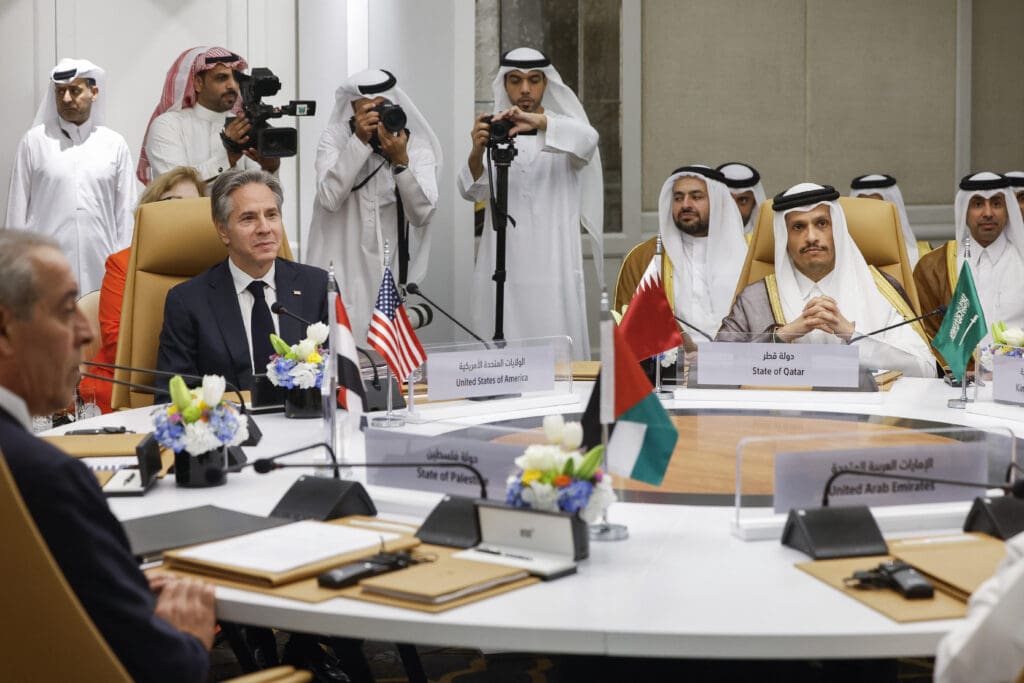The ongoing Gaza war has showcased Qatar’s strengths as a mediator. Although Doha may not appear to be a major international player at first glance, it has nonetheless proven to be an invaluable actor in the United States’ attempts to end the war.
Despite its small size and population, Qatar plays an outsized role on the global stage. Over the past decade, the small peninsular emirate has skillfully navigated complex geopolitical landscapes, using its unique position as a credible and impartial actor to facilitate crucial negotiations in numerous international conflicts. The country has developed a foreign policy strategy of mediating in global crises. Additionally, Qatar has leveraged its strategic location and immense natural gas wealth to create soft power, which it has deployed to advance its interests.
Most recently, Doha has proven its diplomatic skill in the unfolding crisis in Gaza as the only reliable conduit to Hamas’ decision-makers. Grounded in pragmatism, Qatar’s approach has allowed the country to achieve diplomatic outcomes often beyond the reach of larger powers, such as an exchange of hostages in November.
As the U.S. has continued to provide overwhelming support to Israel even as the controversy around Israel’s conduct mounts, the Gulf monarchies have sought to prioritize diplomacy over violence, recognizing that there is no military solution and that a substantive political process is the only way forward.
A Critical Mediator in Gaza
Political mediation remains a crucial element in the ongoing war—not only in bringing about an end to hostilities, but also for initiating a genuine, lasting peace process between Israelis and Palestinians. The continued absence of effective mediation in the Israel-Palestine conflict, due to periods of delay and neglect by all sides, perpetuates a recurring cycle of violence—particularly in the Gaza Strip, where the most recent war is merely the most destructive of a handful of similar attacks over the past 15 years. Absent political mediation, Israel and Hamas will find negotiation, compromise, and lasting solutions fleeting. Qatar has offered its services to bring about the change required to ensure peace. The country’s negotiators have relied on the emirate’s unique status as a friend and partner for different regional and international players across the geopolitical spectrum.
Most importantly, Qatar has found a winning formula that enables it to work with ideological competitors for whom talks exist beyond the reach of conventional diplomacy. Yoel Guzansky and Ilan Zalayat at the Institute for National Security Studies in Tel Aviv recently noted that Qatar is the only country in the world that can bring together the conflict’s principal players: the Americans, the Israelis, and Hamas’ leadership. These efforts bore fruit when the Qatari foreign ministry announced early in the war that Israel and Hamas had agreed to a temporary truce, including a prisoner exchange. Regrettably, the two sides broke off the mediation efforts after only a few days, resuming a brutal war that has since claimed tens of thousands of additional lives.
Qatar’s unique diplomatic position requires delicate balancing and prudent maintenance. While Doha’s decision to host Hamas’ political offices proved extremely controversial in the West and other parts of the Arab world, it also provided a venue for mediation between the political-militant group and its adversaries—and granted Qatar a moderate level of influence with Hamas’ leadership. Indeed, Qatar established this office in 2012 at the explicit request of the Obama administration, which sought to prevent Hamas from moving its offices to Iran after fleeing Damascus amid Syria’s civil war. Indeed, if Hamas’ leadership was based in Tehran and an October 7-like event had occurred, Israel and the U.S. would have been forced to work with Iran to free Israeli hostages—a far less appealing proposition than the current arrangement. Instead, Qatari Prime Minister and Minister of Foreign Affairs Sheikh Mohammed bin Abdulrahman Al-Thani has worked with the heads of intelligence agencies from the U.S., Israel, and Egypt to bring about the return of Israeli hostages and provide humanitarian aid to beleaguered civilians in Gaza.
Courting Controversy
Despite significant and continuous efforts since the outbreak of the Gaza crisis, Qatari diplomacy has faced pressure from factions within both the U.S. and Israel to distance itself from Hamas or expel the militant group altogether. This has led Qatar to announce that it will reevaluate its mediation role between Hamas and the Israeli occupation. According to a CNN report, a letter signed by 63 Democrats and 50 Republicans asserts that the U.S. should exert great pressure on Qatar and Türkiye to expel Hamas leaders present in their countries.
Qatar has reacted to these calls with clear frustration. Prime Minister Al-Thani suggested that his country’s relationship with Hamas was being exploited by those seeking to score cheap political points against the emirate. Qatar’s efforts to broker a lasting ceasefire in Gaza have failed, but many in Qatar blame obstructionism on Israel’s part, given some members of the Israeli government’s stated preference to annex parts of Gaza. Qatar’s resentment about this situation has been compounded by a fierce Israeli campaign targeting the former’s media—including a broadcasting ban on Al Jazeera, Qatar’s state-owned TV network, due to its critical coverage of Israel’s actions in the war.
As long as the U.S. government considers Doha an important ally, as President Joe Biden has repeatedly affirmed, threats from the current Israeli government will not have a significant impact on Qatari foreign policy. However, serious developments are taking place within the U.S. Congress that could jeopardize Qatar’s position. Congressman Steny Hoyer (D-MD), the former House Majority Leader, said in April 2024, “If Qatar fails to apply this pressure, the United States must reevaluate its relationship with Qatar.” Senator Ted Budd (R-NC) introduced a resolution to consider terminating Qatar’s status as a Major non-NATO Ally. If these moves gain momentum, they could significantly alter Qatar’s regional role. While Qatar would likely attempt to accommodate America’s requests to divest from Hamas altogether, these developments may not favor U.S. interests in the long run.
Benefiting from an Independent Foreign Policy
Qatar’s position as a regional mediator is longstanding and largely unparalleled. Over the past two decades, Qatari diplomacy has contributed to a ceasefire in Yemen, a landmark political agreement in Lebanon, and the end of a bitter and seemingly intractable border dispute between Djibouti and Eritrea. Qatar also helped to end the Second Sudanese Civil War and significantly decrease the violence in Darfur by hosting a multilateral peace conference in Doha that resulted in the “Doha Document for Peace.”
During America’s 20-year war in Afghanistan, Doha hosted the Taliban’s leadership and offered the city as a venue for negotiations with the United States. In 2020, Washington and the Taliban signed a landmark agreement providing for the U.S. military’s withdrawal from Afghanistan the following year. When the American-backed government in Kabul collapsed in 2021, Qatar played a critical role in evacuating U.S. personnel and Afghan civilians from the Kabul airport. Doha’s efforts in this regard were a major factor in Biden’s decision to name Qatar a Major non-NATO Ally in early 2022.
Qatar’s diplomatic forays are not limited to its immediate neighborhood. Qatari mediation succeeded in reaching an agreement between Russia and Ukraine to exchange dozens of children displaced by the ongoing war, and to hold direct negotiations between Moscow and Kyiv.
From these examples, it is clear that Qatar’s neutral foreign policy serves the country’s interests, as well as those of the United States. However distasteful the presence of Hamas leaders in Doha might be to some American observers, expelling them would be a major strategic error because their next place of residence would almost certainly be far harder for Western negotiators to access, making conflict more intractable and deadly. Keeping Hamas in Qatar provides a controlled environment for dialogue, potentially easing tensions in one of the world’s most complicated conflicts. Thus, maintaining Qatar’s role as a host for Hamas leaders is crucial for any hope of progress in peace negotiations.
Washington often gripes that its “free-riding” partners seek to contribute as little to their own defense as possible, leaving America to shoulder the burden. But Qatar has shown that even small states may play an outsized role that contributes to reducing tensions, supporting peace initiatives and U.S. foreign policy goals in the process. There is little question that Qatar’s deft diplomacy during an uncertain time has done much to prevent a regional war.
The near future of the war, and more broadly of the region, remains unclear. Qatar’s diplomats remain engaged to resolve the Gaza war, and the Gulf Cooperation Council states as a whole have advocated for a credible peace process aimed at achieving a two-state solution. Qatar’s mediation success lends credence to the hope that even this most intractable of conflicts may one day come to an end.



